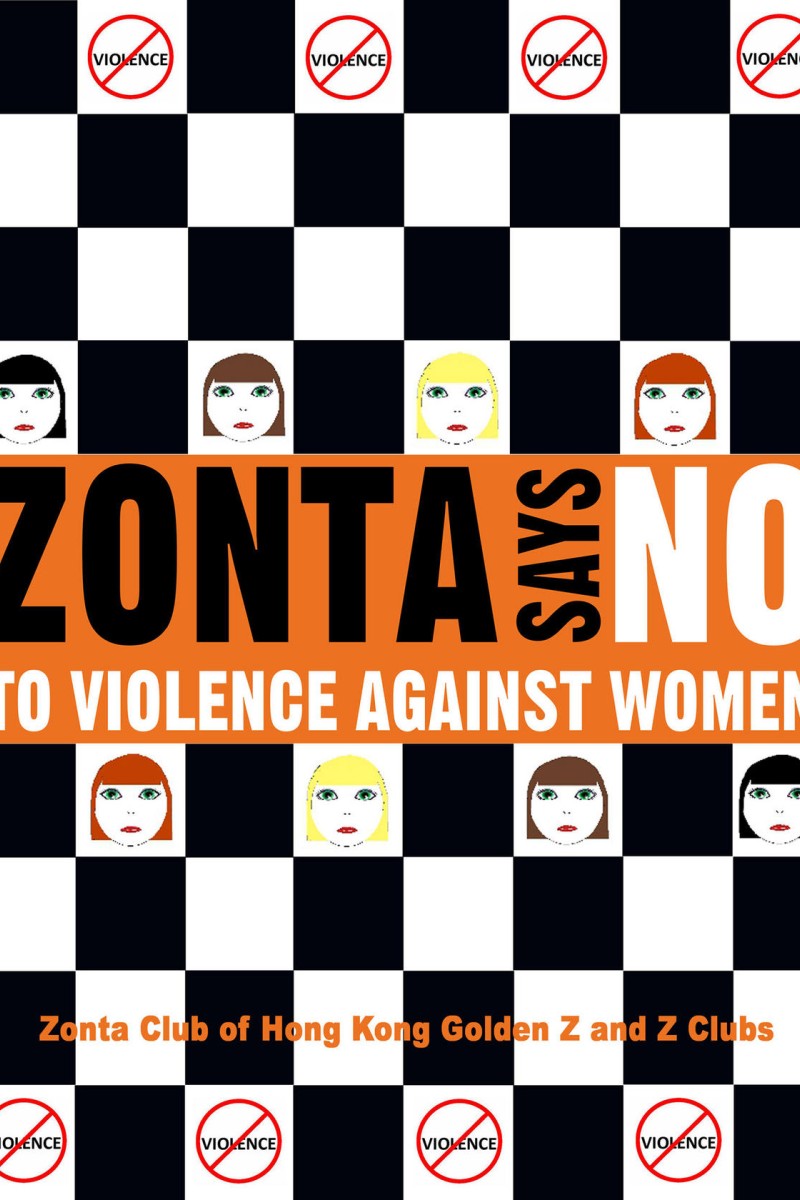 Alison Leung's design symbolises the fact that all women, no matter what race they're from, should stand up to violence.
Alison Leung's design symbolises the fact that all women, no matter what race they're from, should stand up to violence.Hong Kong has a reputation for being a safe place with a low crime rate, but domestic violence is a major problem in the city. Over the past year, 856 cases of child abuse and 3,917 cases of spousal or partner battering cases were reported by the Social Welfare Department, while the police reported another 1,669 crimes of domestic violence.
Zonta International is an organisation that advances the status of women. To raise awareness of violence against women and girls, it launched the "Zonta Says No to Violence Against Women" campaign.
Earlier this year, Zonta Club of Hong Kong decided to invite young people to get involved, "so when they grow up, it doesn't become an issue", said Yolanda Yeh, chairman of the Z Club.
Secondary and university students from its Z and Golden Z Clubs took part in a ZSN (Zonta Says No) folder design contest to promote an end to violence against women and girls.
Alison Leung Hoi-sai of True Light Girls' College won the competition with a design that "symbolises the fact that all women, no matter what race they're from, should stand up to violence", she said. Her design will be printed on 100 folders for each club.
Yeh hopes that this competition will inspire people to start asking questions about domestic violence. "The more people you can reach, the better," she said.
Children need protection
Physical, psychological, and sexual abuse, and neglect of individuals younger than 18 are all forms of child abuse. Child abuse has many causes, from parents' or caretakers' stress, to a lack of proper skills to take care of their children.
Some parents may take their feelings of disappointment, failure, despair or anger out on their children; sometimes parents or caretakers use physical force to control their children; or others just ignore their needs.
And when parents and caretakers do not properly look after children with special needs, due to a lack of guidance or assistance, this is also child abuse.
Of the 3,917 spousal or partner battering cases last year, 1,820 of them - nearly half - involved children younger than 12.
Children who have witnessed violence at home may feel distressed or vulnerable, or even blame themselves for other family members' disputes. It's normal to have those negative feelings, whether they have been abused themselves, or simply after witnessing violence against a family member. It's important to not to bottle it up, but to talk to outsiders such as relatives, friends, teachers, social workers - or even the police - if and when necessary.
It affects all walks of life
Domestic violence is a general term for when a person controls or dominates someone in a close or family relationship.
The victim is often dependent on the offender. It often involves a series of abusive incidents, and can include extreme violence, with the cycle of abuse continuing until it is finally broken.
The long-term effects on the victim can be devastating. The Social Welfare Department found that more than 50 per cent of people who abused their spouses had a history of family violence.
Domestic violence is nothing to be embarrassed by; it can happen to any family. Talking about it can prevent it from happening again.
Everyone involved - abusers, victims and witnesses - should seek help as early as possible so both victims and their abusers can receive professional treatment and counselling.
A wide range of welfare services for both victims and abusers are provided by the Social Welfare Department as well as NGOs.
Refuge shelters, family crisis support centres, intervention programmes for batterers, as well as medical and psychological services are easy to reach through 24-hour hotlines.
Domestic abuse is not just the problem of individual families. Children who experience it may suffer long-term emotional and psychological trauma, and victims of abuse are also likely to continue the cycle of violence they witnessed.
If you need help, don't be afraid to reach out. Go to Social Welfare Department's website to find out how
